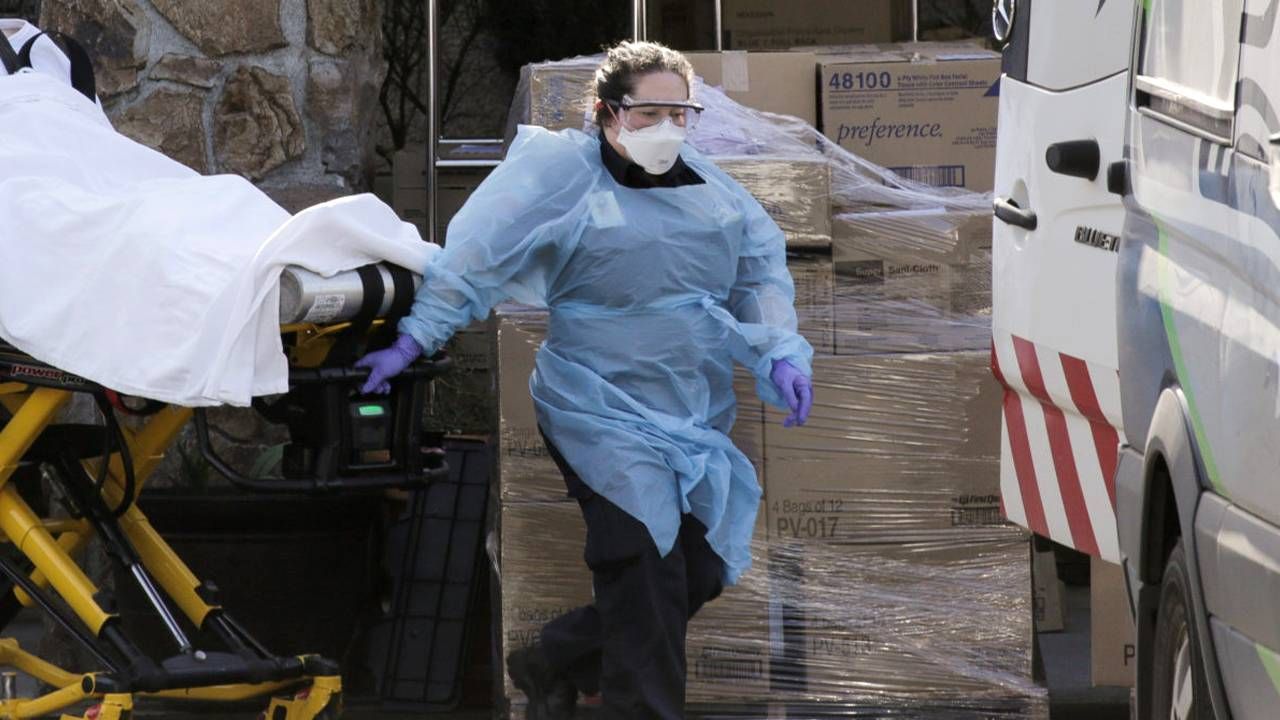States Make it Harder to Sue Nursing Homes Over COVID-19 Related Deaths
Nearly two dozen states shield nursing homes from COVID-19 suits. Some say they're protecting homes from financial ruin; others worry bad actors won't be held accountable.
In June 2020, employees at Granite Creek Health and Rehabilitation Center, an Arizona nursing home, began testing positive for COVID-19. Managers required them to come to work anyway, state health inspectors would later find. By the end of the following month, 15 residents had died of the virus.

Several families have filed wrongful death lawsuits against the facility — but they'll face a steep challenge.
The Granite Creek case is notable in its level of evidence, particularly around its disregard of pandemic safety protocols. Several families have filed wrongful death lawsuits against the facility.
But in Arizona and other states across the country, COVID-19 related lawsuits against nursing homes now face added hurdles.
"The publicly available information as it relates to this case, and what this administrator was requiring staff to do, is pretty egregious," said Chris Jensen, one of the attorneys representing the families of Granite Creek residents. "But you've got a whole lot of cases where people ought to be held accountable for negligence that injured or killed people that you're probably not going to be able to bring."
The Grand Canyon State joined at least 17 others in passing laws this spring that gave health care providers — including long-term care facilities — increased protections from COVID-19 related suits.
Often crafted at the behest of the nursing home industry, the laws raise the bar for individuals seeking to sue a long-term care facility for an injury or death due to COVID-19 — and potentially set a precedent for future pandemics.
"Whether it's a flu pandemic, a COVID-19 pandemic, a COVID-30 pandemic — you're still going to have the same issues," said David Voepel, CEO of the Arizona Health Care Association, which represents more than 170 long-term care facilities. "The pandemic causes this, so why should employers be liable for something that's totally out of their control?"
But elder care advocates say these laws are too harsh — preventing older adults from seeking justice for wrongdoing or neglect as the coronavirus continues to spread across the country.
A Necessary Measure?
At the dawn of the pandemic, many states issued executive orders that shielded health care providers from lawsuits related to the coronavirus.
Intended to prevent a flood of litigation from overwhelming the health care system amid a global emergency, these protections have since expired in many states.
"I don't think any family member who's lost a loved one due to neglect or abuse is pursuing this course of action lightly."
In New York, former Governor Andrew Cuomo signed legislation in April 2021 repealing broad liability protections for its nursing homes, for example, after public scandal over the state's undercounting of COVID-19 nursing home resident deaths and an FBI probe over the decision to grant such immunity. A broad federal bill that would have made COVID-19 immunity the law of the land also failed to pass in Congress last year.
But in other states, primarily those with GOP-controlled legislatures, lawmakers codified these immunity shields into law this spring.
Leaders in the nursing home industry have said these measures are necessary to protect long-term care homes from financial ruin at a time when these facilities have faced harsh criticism over their handling of the pandemic. About a third of all deaths due to COVID-19 in the United States were among people who lived in long-term care facilities.
"We need to protect the long-term care industry from failure," said Bill Edwards, a Florida-based lawyer who helps advise nursing homes against COVID-19 suits in several states. "If these protections go away and they shut down, what will happen to these residents?"
"This has a been deterrent, and I am thankful — because you have states like California that don't have any protection for health care providers."
Critics say these laws unreasonably limit residents and their loved ones' access to the courts.
"This [Arizona] legislation puts too high of a bar on families who are seeking justice," said Dana Kennedy, state director of AARP Arizona. "I don't think any family member who's lost a loved one due to neglect or abuse is pursuing this course of action lightly."
State immunity laws often require plaintiffs to prove a nursing home showed deliberate disregard or extreme indifference for a resident's safety — raising the bar beyond the standard for a typical nursing home negligence claim, which merely requires they demonstrate harm due to carelessness.
Some go further: In Florida, a person seeking to sue a nursing home for COVID-19 related harm must find a doctor who is willing to swear, under oath, that they are confident a resident's infection was due to a specific person who acted with intentional malice.
Curbing Litigation
Across the nation, the immunity laws appear to have quelled many potential coronavirus lawsuits.
"Family members tell us attorneys here [in Arizona] just aren't willing to take the cases," said Kennedy. "Because it's now hard for an attorney to say, 'I think that we could win this.'"
Members of the Florida Health Care Association, which represents 80% of the state's nursing homes, reported around 90 notices of intent to sue prior to their law's passage, according to Edwards. None have reported any since.
"This has a been deterrent, and I am thankful — because you have states like California that don't have any protection for health care providers," said Edwards. "My clients there have approximately one hundred and twenty-five lawsuits filed against them."
Nursing home industry leaders say it's evidence that the legislation is necessary. Many of these laws will sunset a year after their passage unless extended by state legislatures.
Voepel said his organization believes more COVID-19-related lawsuits against nursing homes may be "coming down the pike," though few have been filed against Arizona nursing homes since the state law, which applies retroactively to the start of the pandemic, went into effect. Edwards, of Florida, echoed this.
"I think attorneys here are waiting for the Florida law to expire," he said.
Looking Ahead
But questions remain about the reach of these laws.
In North Carolina, attorneys who represent long-term care facilities have used their state's legislation to broadly claim they are exempt from liability in neglect cases — including those that have nothing to do with COVID-19.
In one of those lawsuits, an 82-year-old woman at a Charlotte, N.C., assisted living facility allegedly drowned to death in her own bodily fluids last year after staff failed to administer the medication she was supposed to receive in the final hours of her life.
"From what I understand, I don't know that the facility was negligent — because back in 2020, staff were leaving in droves."
The home, Brighton Gardens of Charlotte, and its parent company Sunrise Senior Living Services have denied the allegations and are attempting to dismiss the case, citing the state's COVID-19 immunity law.
"This was after we had a whole section in the complaint laying out why this law doesn't apply to the case," said Elizabeth Todd, the attorney representing the family in the lawsuit, who said her team is fighting the motion.
It's still too early to know the true toll COVID-19 shield laws will have on families' ability to sue long-term care facilities — lawsuits take time to file and work their way through the courts.
In Arizona, Voepel isn't convinced that even the Granite Creek case will meet the bar presented by the new state law.
"From what I understand, I don't know that the facility was negligent — because back in 2020, staff were leaving in droves," he said. "So, an administrator calling up some of the RNs and saying, 'You've got to work, otherwise, how am I going to care for these 50 people?' — does that reach the level of gross negligence? I don't know whether that can be proved."
Editor’s note: This story is part of The Future of Elder Care, a Next Avenue initiative with support from The John A. Hartford Foundation.


